When Shadow of Mordor released in 2014, its “nemesis system” was brilliant enough that many people hoped it would define a new generation of games. Years later, that vision of industry-wide character hierarchies that learn, evolve, and remember the player never came to pass.
Shadow of War, the follow-up, further sophisticates its legion of orcs, but that niggling question of “wouldn’t this system be cool in a different game” still sneaks up on you. And this time, given the limits of an expanded version of this system in a macabre world of orcs, it’s damning.
Shadow of War stars Talion, a buff-and-gruff protagonist who would be generic were it not for the fact he is technically dead. Talion becomes known as ‘The Gravewalker’ thanks to a vengeful elf wraith, Celebrimbor, who latches onto his body and keeps him alive.
In the first game, Celebrimbor is introduced as the crafter of the Rings of Power — this is a Lord of The Rings game — and, by granting Talion otherworldly skills, he drafts him into a war to stop the forces of Sauron. By the end of Shadow of Mordor, Talion decides it is time for a new Ring of Power, one that cannot be tainted by the forces of evil.
That’s where the second game takes off: Talion forges a ring to fight against the return of Sauron, but wouldn’t you know it, things don’t go according to plan. Immediately, the ring falls into the wrong hands. You’d think any of the people involved would have learned by now.
Don’t worry, you don’t need to be a huge LOTR fan to enjoy Shadow of War. There are all sorts special quests and collectibles that dive into the larger lore if you’re into that, but the story, on the whole, is silly.
Characters are paper-thin and their story lines are largely boring if not nonsensical. In one egregious example, a main character betrays their morals at the last second without much explanation. But the narrative shallowness doesn’t matter. You are here for the orcs — or, excuse me, the uruk-hai if we’re being pedantic.
Your eventual goal is to build an army of orcs to defeat Sauron once and for all. This time around, your efforts are focused on the network of orcs who occupy/control various castles, each of which has its own chain of command. At the top, you’ve got mighty Overlords who run the place.
You can’t just beeline to the Overlord, chop his head off, and call it a day. You’ve got to thin the lower ranks and infiltrate the castle before you can overtake it. Beneath an Overlord are Warchiefs, each of which defends a regional fort and specific areas of a castle. And each Warchief commands a wider pool of henchmen called Captains, which act as their bodyguards. While the upper echelons at the castle are initially set in stone, the larger infantry constantly shifts and vies for power.
Shadow of Mordor smartly packaged these politics by tying them to orc culture itself, and Shadow of War widens the repertoire of events orcs can participate in.
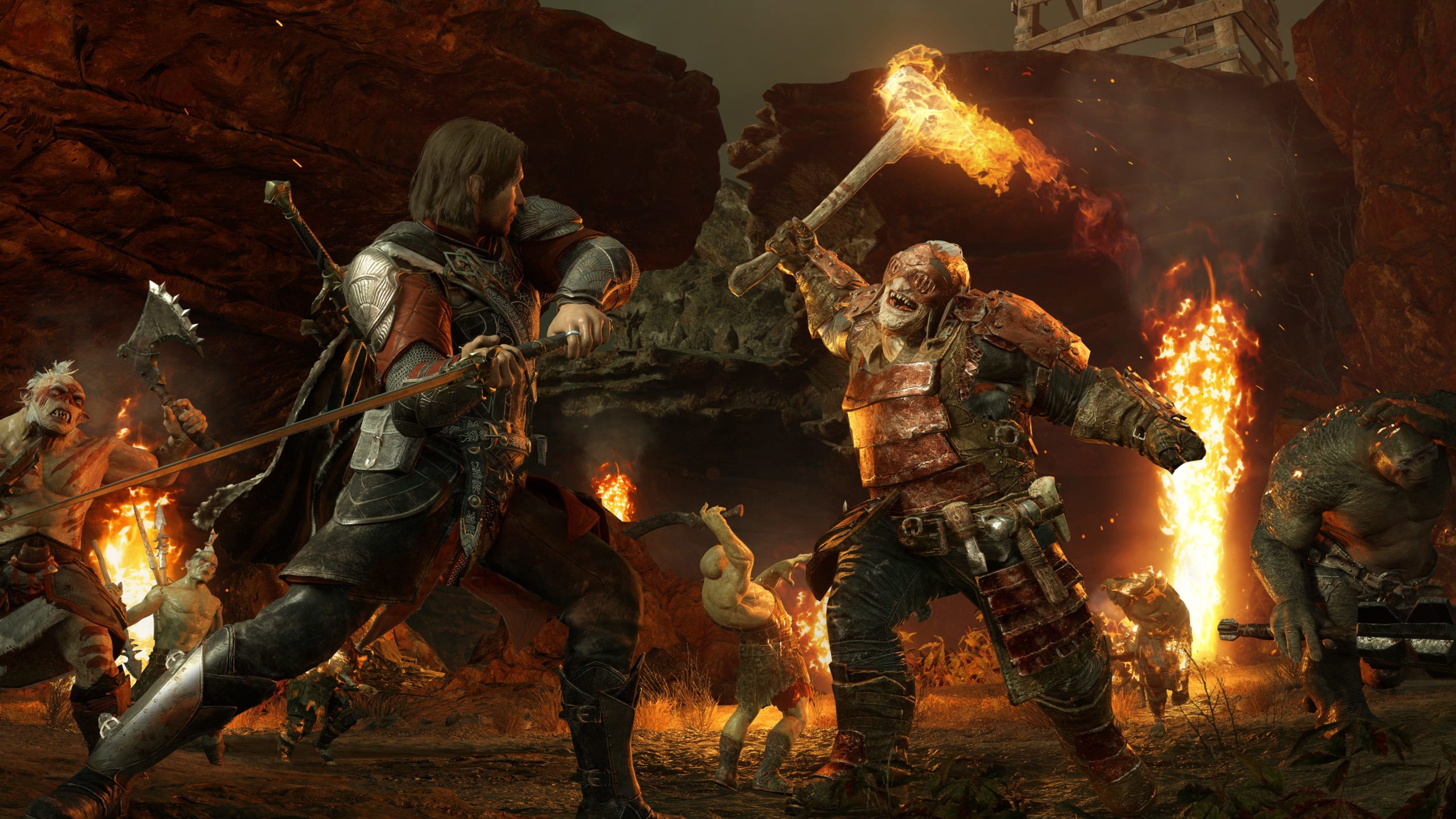
An orc might try climbing the ranks by leading a hunt, raiding a camp, or killing a rival, among other things. That’s where you come in. Shadow of War is an open-world action game, and you have the freedom to meddle in orc affairs however you see fit. The game is segmented into a handful of different regions, each with its own battalion of orcs, and you can roam between them at will.
Sometimes, you might stumble into an orc event without even meaning to, because captains are everywhere. You’ll know exactly when you’ve found a high-ranking orc. Not only does the game pause to zoom up on their faces, often, grunt orcs burst into a welcoming chant.
If these special orcs catch sight of you, they will introduce themselves. Most of the time, Captains and Warchiefs threaten or mock you as if they are cutting a pro wrestling promo on you, which immediately makes it personal. These aren’t just tough enemies. They’re calling you out, trying to make you look like a fool. What are you going to do about it?
These introductions are the cornerstone of the Shadow of War experience. Each one tells you the proficiencies of the orc, which, along with intel you can gather about their strengths and weaknesses, is info you’ll use to attack your target.
Maybe the orc is a “poisonous terror tracker” or a “cursed mystic trickster.” More importantly, it gives you a better look at your orc. Each one is randomly generated, with its own facial features, voice-acting, clothes, weapons, and class. Dig a little deeper and you’ll know what they’re into, what hurts them and what throws them into a rage.
Throughout it all, I felt like I was on some messed-up dating site, browsing orc profiles, except they all contained sensitive health information for some reason. I was always excited when I crossed a cool or handsome orc that that had unusual abilities, because it was more likely that my fight with them would be memorable. I hated when I came across ugly or boring orcs, because there was a greater chance I wouldn’t remember them after the fact.
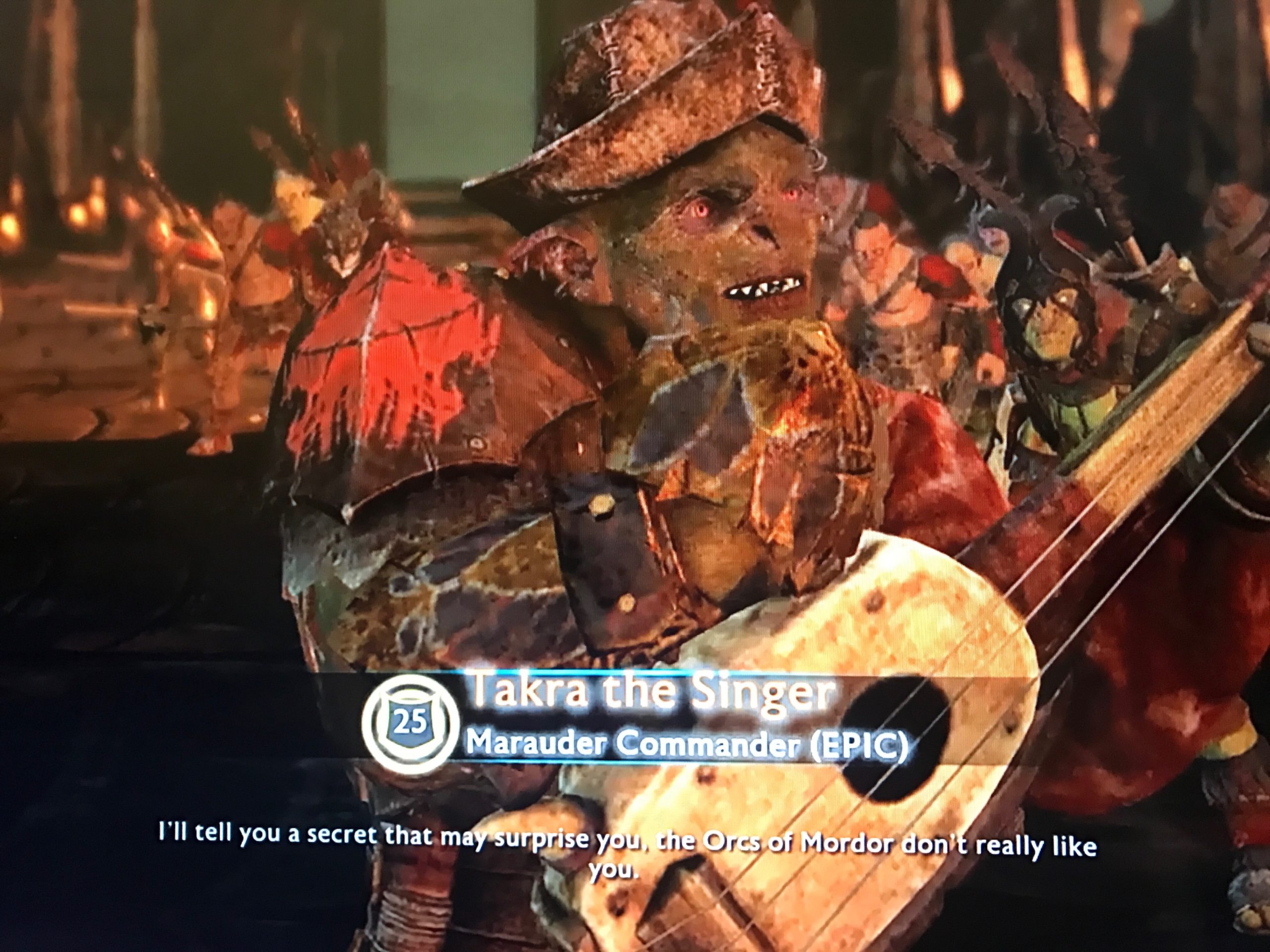
All of this will sound familiar if you played the first game, but the difference is in scope. The underlying ethos of Shadow of War seems to be more. More types of orcs, for instance: in the 45 hours I spent with the game, I kept seeing new stuff all the way to the end.
Your playgrounds are bigger this time around, stocked with more points of interest, quests, collectables, and types of toys to torment your prey. The number of things you can do in this game is overwhelming at first, because you’re barely eased into it. It’s all just there from the get-go, though you might not know how to use it for best effect. Maps are bursting with things like spider sacs, deadly fly nests, beasts, and drinking wells, all of which you can manipulate to terrorise orcs.
There are also plenty of combat options: you can sneak, you can teleport, you can materialise animals or allies, you can freeze and poison enemies — the list goes on and on. And with Talion’s ability to swiftly climb everything, the game often feels like it is brimming with possibility.
Even minor things have complexity. Every ability in the skill tree has three sub-abilities, only one of which you can activate at a time. All gear has stats and can be upgraded to grant you extra skills, like setting an enemy on fire, provided you complete a gear-specific challenge first.
All gear has sockets, where you can add upgradeable gems that grant extra health, damage, and more. There are even daily challenges now. A lot of this didn’t feel essential to the experience, nor did it feel like it improved the game.
Some of it didn’t even make sense. For instance: if the ring I crafted at the start of the game was so unique and mighty, why was I equipping rings dropped from random orcs?
Regardless of all this new stuff, I fell into a familiar pattern playing Shadow of War. First, I’d go into a camp, any camp. I’d walk through the front door, as if everything was cool. Someone would always sound the alarm to sic more orcs on me, but I didn’t care.
Talion is so powerful that you can kill or run away from anyone with ease, at least on Normal difficulty. Then, I’d go into Wraith World, a detective-style mode that lets you see things of interest, like footprints or distant orcs, even through walls.
I’d pinpoint orcs who had information on Captains and Warchiefs, and I’d go after them. Once within my grasp, I’d “dominate” them, forcing them to tell me what they know. I was never certain why Mordor’s leadership let so many grunts walk around with such valuable information, but hey.
Within 10 minutes, I would have a full dossier on every orc of interest. Then, it was time to track them down.
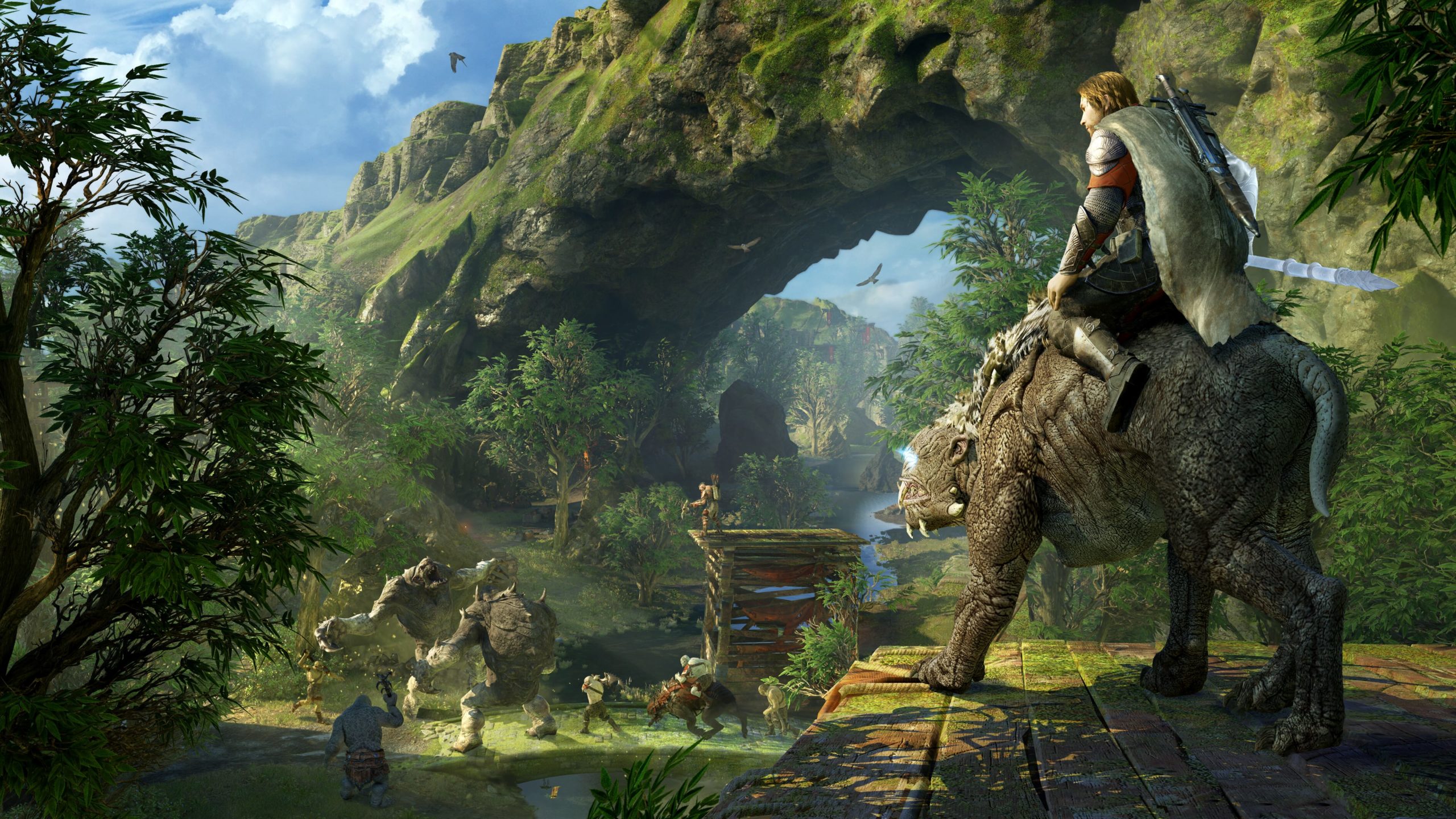
Once in their vicinity, it was time to plan. I’d scope out the map and see what I could use against the Captain or Warchief. Any listed weaknesses would be go-tos, but you aren’t always lucky enough to have any of that stuff lying around.
If you’re patient, you can wait around to see if the Captain walks by a Caragor pen that you want to blow open, or a campfire that you can detonate, as two quick examples. Certain attacks or scenarios can “daze” Captains and Warchiefs, and you can capitalise on it by railing on them with your sword, bow, or dagger.
Fights are hardly ever one-on-ones, however, as you are constantly surrounded by lesser grunts who all attack you at once. You can handle it, though. Shadow of War’s combat system, which is lifted from its publisher’s Batman Arkham series, make combos the name of the game.
The higher your combo, the more damage you do. Big hit streaks power up your ‘Might,’ which you can use to do special moves like Executions. Every kill within this beefs up your ‘Wrath,’ which, once full, allows you to unleash ‘Elven Rage,’ a move that slows down time to give you unlimited Executions. The trick to maintaining a high streak is anticipating and parrying external attacks, which threatens to pull you out of a combo.
You can also deploy special moves in-between regular hits without snapping your streak. Thus, all battles followed a certain tempo, almost as if you are mentally juggling a soccer ball. Even death had a certain rhythm to it, thanks to “Last Chance” button prompts that can save you.
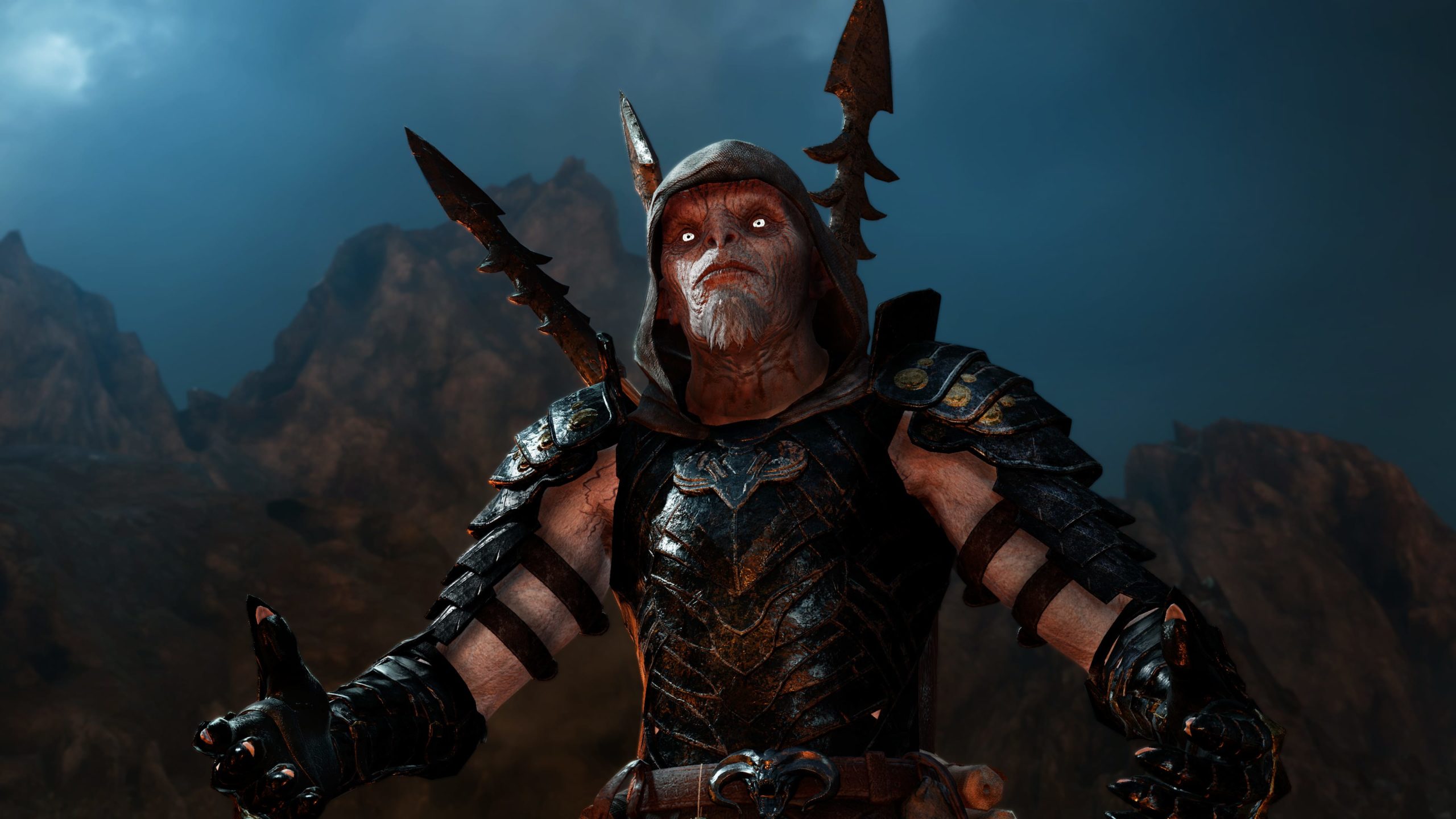
The beauty of it all is that, no matter how much carefully you plot an orc death, things can and do go wrong. The fun is in learning to improvise while everything goes to shit. One time, I landed a critical that set my sword, along with all the dry grass surrounding me, on fire. Orcs ran in every direction, screaming, and before long, I was on fire, too.
Another time, I was hunting a specific orc, only to encounter two different orcs who were feuding with one another. I barely escaped, only to have yet another orc, this time an assassin, sneak attack me. I killed that one, only to stumble on yet another captain while I was low on health.
He was looking for revenge on his brother, who I had fought earlier that day. What he didn’t know was that brother wasn’t actually dead. Fun fact: sometimes, orcs come back to life, stronger, angrier and uglier than before. None of those compare to the pain of having a grunt kill you, though.
Any orc on the totem pole fortuitous enough to land the last blow on Talion can get promoted into a Captain. It only happened a couple of times for me, but no matter what I was doing before, I would always drop everything to go after these arseholes. How dare they?
In the first game, figuring out unwritten rules of the nemesis system was a constant source of delight. This time around, some of that sheen has worn off. I knew for example, going in, that orcs could come back from death, and I knew that enemies would remember our encounters.
By comparison, all the other ‘twists’ didn’t feel like a big deal. Things like surprise attacks from assassins felt less like like like interesting curveballs than they did annoyances, like blocking a troll on Twitter only to have them come back under a slightly different username.
The only time the game surprised me was the time an orc accidentally killed me and broke my best sword with his bare hands. Even then, Talion outclassed him so profoundly in their next encounter, and my revenge was so immediate, that the whole exchange felt like a trifle. The game gifted me a more souped-up version of the blade I had lost, which could have been a trophy, except soon afterward, I replaced that sword with something that had a higher attack.
At some point, I must have destroyed that weapon for points. I don’t even remember the orc’s name now, or his face.
Typically, my efforts were laser-focused on orcs with rank. I sought out Captains first, so I could clean out a Warchief’s bodyguards. Then I’d challenge a Warchief, which, while more tenacious than Captains, were never a big deal to take down.
Finally, once I cleared out an opening, I’d search for candidates to take their place. By this point, the entire nemesis board would be visible to me. I’d go through each orc one by one, scanning their profiles as if they were resumes. Then, I’d appoint my top picks at the castle.
To prepare for the next segment, I would dominate a handful of more orcs from the wider pool. These orcs would act as my army for the next major portion of the game, though they could shift in standing if time passed within the nemesis system.
Once a castle was fully infiltrated, I’d mount a siege attack. All sieges require leaders, and that’s where those extra orcs I conscripted would come in. Each leader can be packed with upgrades, such as mounted cavalry, shock troops, siege beasts, archers, and even flying drakes, all of which are purchased with points you accrue from killing orcs and breaking down extra weapons. Sieges may look like a spectacle, but if done correctly, they are mere formalities.
I would walk from one point to another during these segments, instantly capturing points thanks to how meticulously I took down every single Warchief. After these points were secured, my spy would come out and join me in the attack, so I never had to actually fight much during these segments.
At the end, I’d take on the Overlord, and that was that. The only time I had trouble was when I stubbornly decided to take on the highest-level castle before the end of the game.
In that instance, the Warchief could not only heal himself, he also had a “death defying” ability that would bring him back to life. I took a day to kill another slew of orcs for better gear, and came back with a fury, mounted Graug and all.
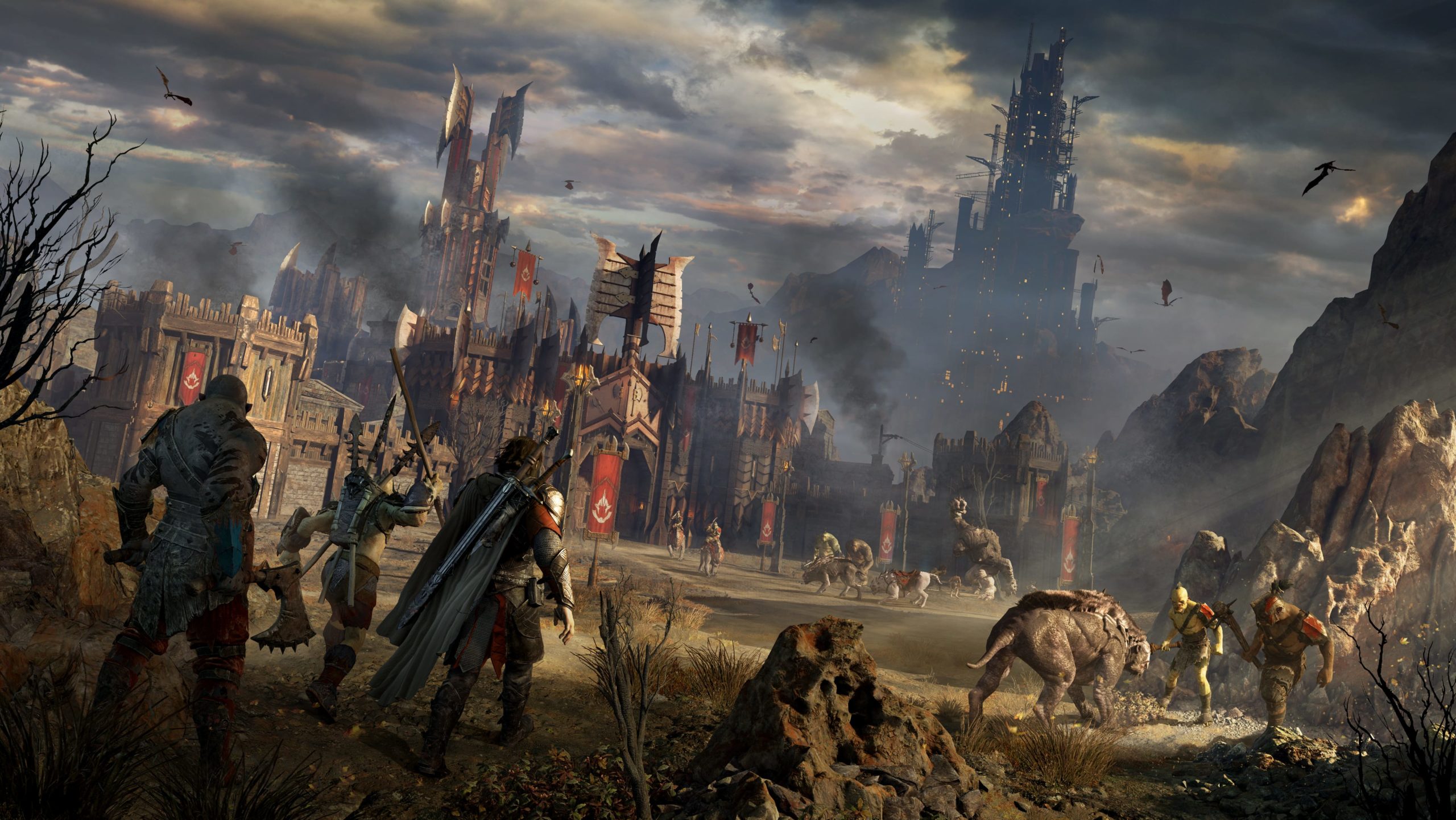
The fundamental issue here is that being good at Shadow of War means the process becomes routine. Find intel. Target underlings. Go after Warchiefs. Attack the castle. Defeat the Overlord. Appoint your favourite orc as new Overlord.
With so many maps this time around, I grew fatigued of this procedure halfway through. And because Talion is so overpowered, I barely died — so there were fewer chances for orcs to remember our previous encounters.
It may be unfair to criticise the Shadow games for the failure of other games to adopt its signature mechanic, but after 40+ hours of playing Shadow of War, I’m left feeling that the nemesis system is wasted on this series.
It may be rich in its complexity, but it is applied to an ugly world and subject matter. The orcs spout taunts, but they don’t have real personality. I remember them by their weaknesses (or looks) more than anything else — which is to say, their defining characteristic is a mental catalogue of how they can be killed. You don’t draft orcs to your cause, you ‘dominate’ them by controlling their minds.
Every time, Talion would growl angry lines ( “KNEEL BEFORE ME”) and the game would emphasise the orc’s terrorised face, right before exploding its head into a pulp. Navigating Mordor at all makes me feel like a serial killer, thanks to an unsettling soundtrack that sounds straight out of a horror movie.
Heck, Talion’s abilities allow him to slink about in darkness, or teleport around, as if he were hacking through a summer camp in a Friday the 13th movie. Talion can easily mangle his prey, and like Jason, the fucker just will not die. Where other open-world games like Zelda: Breath of the Wild, Red Dead Redemption, or Assassin’s Creed: Black Flag invite you to explore lovely locales, Mordor is a horrible and dreary place.
Here, all culture revolves around murder. It’s the sort of place where it is not unusual for maggots to reanimate a corpse. And since the nemesis system regularly replenishes the army of orcs, the whole endeavour feels useless.
Mordor is always churning more evil. You can’t make a difference, or put a real dent into any of it. To dwell in this place, or to influence its politics, feels like indulging in something hateful. Staring into the void and all that.
There are bright spots, especially when you command orcs to do specific things. You can make orcs attack one another, and it felt good to have them succeed at their orders. Orcs you particularly like can become your bodyguards, which you can call upon at any time.
Sometimes, orcs will throw down in the Fight Pits, which are automated battles you cannot interfere with. I would watch intently from the sidelines, curious if my orc could stand on its own. I’d find myself yelling at the TV, encouraging my orc to push harder. When I fought orcs, their special abilities would never get much of a chance to shine because I’d cut them down too quickly. But here, I watched in awe as my orcs strutted their stuff.
In one particularly cool moment, I saw an orc make decoys that baffled and overwhelmed their opponent. I’d never seen that before. He won, and I felt proud. I went on to spend some time teaching my orcs special abilities, which made this part of the game Pokemon-esque.
But I still couldn’t help but notice that whenever I found a cute orc out in the wild, I’d end up running away from them.
I didn’t want to kill them myself, I didn’t want to chance the possibility that they’d die on the Fight Pits, and I certainly didn’t want to make them my slave. Interacting with them at all felt wrong, given the options available to me in the game.
For a moment during a questline about two of the only memorable orcs in the game, Shadow of War feels self-aware. A character tells me I am cruel, because I’ve dealt with a traitor by mentally breaking them. The moment passes quickly.
Soon, Whatever contemplation this inspired was shattered by a pop-up notification that gleefully informed me that now, if I “shamed” an orc, there would be a chance for them to become deranged. I did that to an orc during this storyline.
Later, I was shocked to find the maniacal orc out in the wild, with no memory of what had transpired. All they could say was that they regretted crossing me, that they shouldn’t have done it. I could hear the despair in his voice. I teared up, and moments later, I drafted him back into my army to see what would happen. He’s my bodyguard now, but I’ve yet to call him into battle. I feel too guilty.
For all the praise that this series has generated over ’emergent experiences,’ nothing matches how this series of events made me feel.
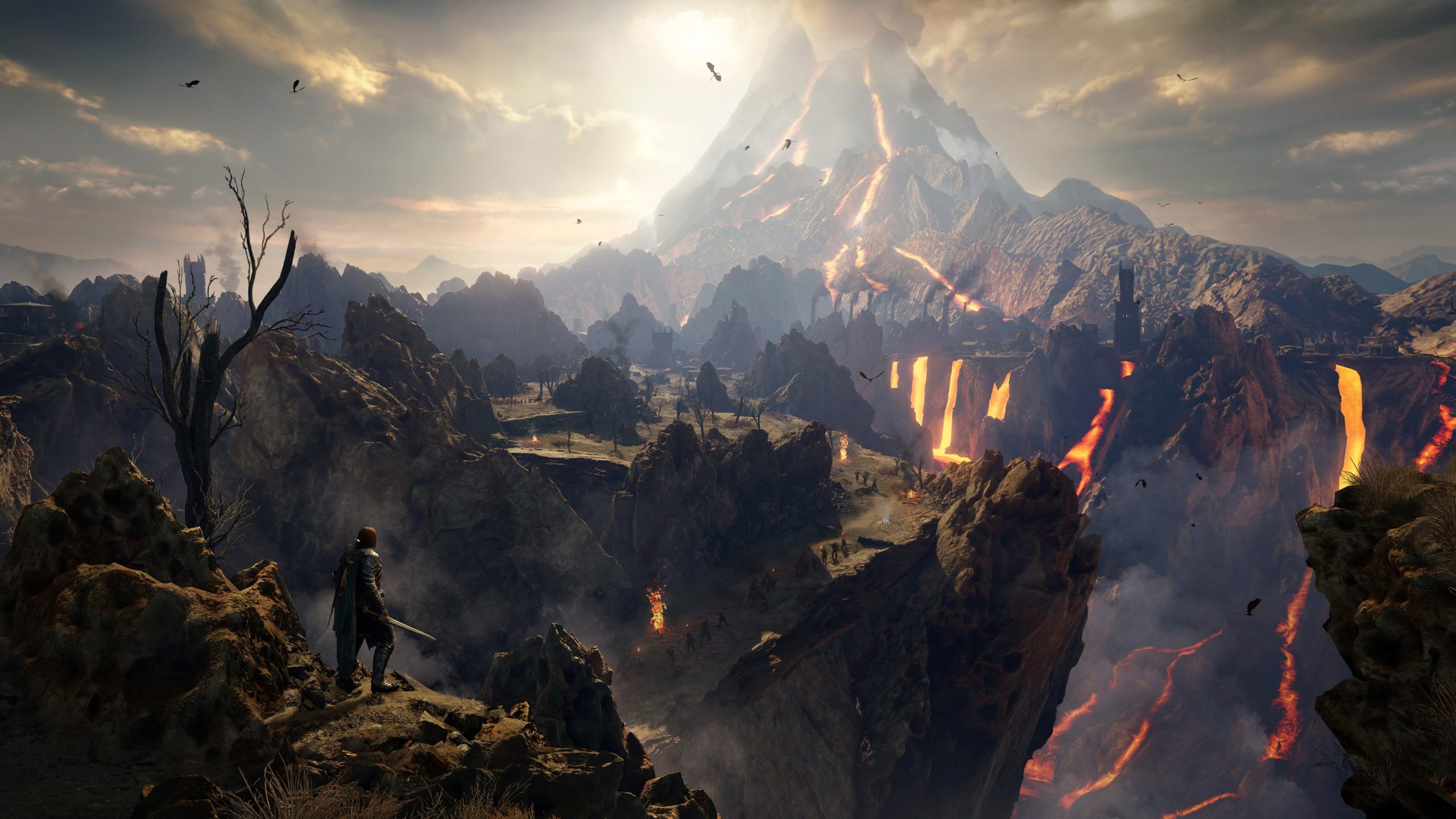
Much has been made about how Shadow of War brings in the industry’s favourite money-making system, loot boxes and microtransactions. The game actually doesn’t stumble here. I liked their inclusion as a means to gain more loot and orc minions, and I appreciated that you can buy at least a few kinds of boxes without spending a dime. I found that, through the normal course of play, I could afford a bevy of boxes that bolstered my ranks.
It was a time-saver that saved me a few seconds if my orc ranks were depleted and I didn’t feel like recruiting new ones in the world. Instead of wasting time fighting yet another orc, I could just buy a box using the ample amounts of in-game cash I’d amassed and get some cool new additions to my roster. Given that Mordor’s whole spiel is that orcs are endless, the gacha-like quality of loot-boxes is a good fit.
It also helps that you can earn loot boxes by doing daily challenges, or “online vendettas” where you kill the nemesis of players around the world. Plus, the player you help out also get bonuses. It’s possible that the post-game portion of Shadow of War, or the online castle sieges, push players more toward microtransactions and instills more of a desire to use loot boxes. We’ll report back on this next week, once we’ve spent more time on these sections of the game.
But so far, during the lengthy main questlines, the temptation or necessity of spending actual money never happened in my game.
I’ve focused most of this review on the systems within Shadow of War, it’s because they are the most interesting part of the game. Its characters are forgettable. Shadow of War technically has things like strong female characters and heroes of colour, but the game does them a disservice by making the missions involving these characters rote and uninteresting.
You’ll be asked to do things like ‘Infiltrate this fort and kill X number of [insert enemy type here.]’ Or you’ll need to kill every enemy on the screen. Stuff like that.
Despite my criticisms, Shadow of War’s purgatory is seductive. Technically, it is the only game doing the nemesis system these days, and so there’s nowhere else to get this stuff, even as grimly executed as it is, anywhere else.
When the game informed me that there would be no turning back after the final mission, I took stock of the nemesis board. I stopped and dominated more even more orcs. I didn’t need them. By this point, I was drowning in orcs.
But like a Ring of Power whispering in my ear, I just couldn’t let go.
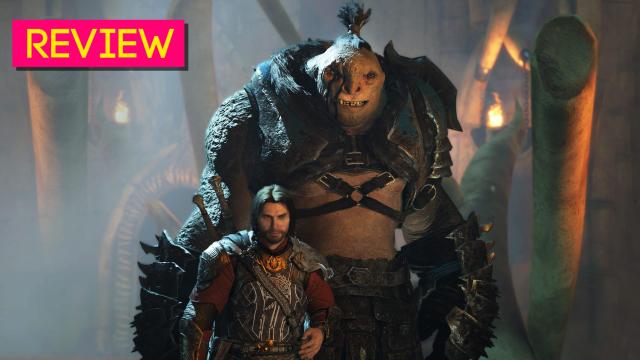
Comments
34 responses to “Middle-earth: Shadow Of War: The Kotaku Review”
This touches upon the biggest change I’ve noticed in gaming in the last 5 years or so. With the emergence of open worlds and so many things to do, I find quite quickly that it begins to feel like work – “You mean I have to do ALL THIS to progress? Well, at least you’ve given me a list to tick off.”
The Witcher 3 skirted this pretty well with a killer story, the Batman Arkham games did it well too. Not THAT many time wasting things to do and it all felt super cool the entire way through, but with GTA and the first Shadow of War game, I felt this really really strongly. There’s no point in having hundreds of things to do when none of them are actually that much fun to begin with. The actual gameplay itself has to be brilliant, or I just feel like I’m wasting my time gaming when I could be doing something that adds to my life in a positive way.
This is why I avoided Destiny and things like that. Looks amazing but going in they make it clear their purpose is to soak up as many hours of your life as possible. I only have one life and I only have so many hours per week for fun solo times. I don’t want to spend them all on the one game. It’s boring and makes my life feel small.
Indeed. There’s a huge difference between a games open world that’s designed to enrich your experience, and one that’s just designed to ‘keep you busy’.
GTA 5 for example versus Mad Max. I love both games, but GTA 5 had a rich open world while Mad Max was just busywork embodied.
Metal Gear Solid V too. I was SO done with that game and it’s stupid picking flowers and base management bullshit.
Like, respect my time. Don’t make me waste it.
BOTW is another good example. It’s open world is very much part of the magic of the game. Where in some games I feel like the devs aren’t respecting my time, BOTW I really wanted to explore to see what else I could discover.
Even though I’m tired of endless iterations and re-releases, I’ll give Bethesda credit. Skyrim had that too. It really did have a great open world if anything.
The funny thing about Destiny is that, there isn’t really *that* much to do, but for me it’s rather satisfying to play an hour or two here or there instead of consistently every day. I hadn’t played all week, logged on last night for an hour and upped my light level through powerful engrams and was rather satisfied by that. The only exception to that is the raid, which is easily the best part of the game.
I do agree though, the growing trend of throwing the kitchen sink at you to hide the core campaign and its short length from you is rather obvious. The first Watch Dogs was terrible for that.
Open world fatigue in all its glory.
Ubisoft are the grand masters of filling their worlds with ridiculous and often useless collectables.
I recall I was close to getting platinum on one of the earlier Assassins Creed games, I just needed to collect the feathers strewn around the map.
I could see their locations but about halfway through the task I stopped…..I was done, 100% in sight and I simply couldn’t be bothered fast travelling about to find feathers.
A successful title that did way too much to its own credit was Saints Row 2.
As you say it’s the gameplay that makes the difference and the endless distractions in SR2 were fun.
Witcher 3 I think nailed the concept that side missions don’t have to be boring, even collecting 10 monster parts can be fun with a bit of effort in writing.
Destiny is digital crack…..literally it is built as an interactive gamer drug.
Far Cry 3 is also an example I think. I really liked the game. The music in particular was really cool, but so was the gunplay. So I reinstalled and played a little. Right up until the map opened up. I took one look at the map and the skill tree and thought “right-o nope, not doing all that again” and uninstalled. Awesome game but it’s going to have to remain a memory. I just don’t have the time to justify all the ‘work’ it would require to play it again.
Killer comment!
This is one of the reason I’m still loving Nintendo. They may not be up to speed with some things (catching up in many areas) they they still make amazing, but different, games and fun consoles
Agreed. I think it is a result of many gamers basing their purchases purely on how long a game is (you see comments about this is pretty much every gaming forum). Developers often have to add a shit load of padding into their games to satisfy these people.
I think the games are becoming worse for it.
100% this. I’d rather have a good short game than a long boring game. I’m time poor and have a huge stockpile of games I need to finish, yet have to trudge through artificially inflated fluff in many games. The move to open world games has not helped this as well as the MMO style farming of materials.
Even though reviews like this are saying otherwise, I can’t wait for people to still complain that buying loot boxes is necessary and that the game was intentionally crippled to force people into doing so.
just remember, develeopm ent time was taken up to add in something that should not of been added in the first place, its even worse when one can just alt-tab and bring up cheat engine to freeze the currency required for the loot boxes because everything is stored client side not server side
Looks like another “AAA” game designed by a bunch of suits in a boardroom going through a checklist. Terrible story, lifeless open world with nothing to do in it, button mashing combat with I WIN prompts to defend yourself when you’re about to get hit, etc etc. Yawn.
Yeah the button mashing combat ala assassins creed *shudder* is what turns me off this game.
And I agree with your points about AAA games being static and bland
My biggest criticism of the first game was that it was too easy and your character too overpowered. I died once in my play-through. I hardly even got a chance to see the nemesis system at work, I didn’t even know how it worked until I died 8 hours in. Also by the time I got to the second area it was becoming repetitive and I rushed through the rest of the game as quick as I could.
I do want to play this, maybe on a higher difficulty, but it sounds like it will become a bit of a slog to finish, and I like to finish things, though that’s less important these days when I have so little time, oh to be a teenager again.
This sounds a lot more positive than I was expecting. The Nemesis system and ‘murdery medieval Batman’ style combat was the star of the last game, and all I really wanted to see done again, but better, in the second… and it seems like that’s exactly what we got.
I mean the first game’s story and characters were garbage, too, and I still loved it. And from what all the reviews are saying, you can pretty much either ignore the lockboxes (ugh, *spit*), or dump unused in-game currency into them for shits and giggles/when lazy.
This is all sounding very good, to me. I was going to wait for a ‘GOTY’ version, but now I’m suddenly keen again!
ive only seen this review and PC Gamers review so far, apprently IGN and another site have spoilers in their reviews though.
According to this reddit thread 9https://www.reddit.com/r/shadowofmordor/comments/74fz4f/reviews_are_out/) PC Gamer, Game Spot and Polygon are the only sites that have given it a 70-75% score the rest are all 8s and 9s
People get so obsessed with review scores.
Like investors and publishers 😛
It’s true though, I’ve even seen some reviewers get jumped on for handing out a different amount of imaginary opinion points than another.
Often bonus payments to the developers are tied to getting a certain meta-critic threshold. One very successful game had it’s devs miss out on a bonus because it was contracted at an 80% average and it only got a 79%.
I wish I could remember the name of the game.
I’m pretty sure that was Obsidian with Fallout: New Vegas.
Agreed. Loved the overpowered feeling and the over the top combat. In a world of “Hardcore” RPGs and so many games trying to be uber difficult it is nice to see a game that is just good old fashioned easy fun.
Good to be able to switch your brain off for a bit and kill some uruk-hai. (Yeah there is a difference)
I read Patricia’s articles and it becomes a somewhat tedious read to a certain extent, but I do get kicks out of her comments haha
“Talion is so powerful that you can kill or run away from anyone with ease, at least on Normal difficulty” – PH
Which is it Patricia you ran away because the Orcs were schooling you or you ran away because they were cute?
Why would it be necessary to even run away If the game is too easy….. time to mosey on up to the next difficulty.
As for putting the nemesis system into other games……. yup could imagine that happening. If Patricia had her way the game environment would be in a well lit paradise island full of cute characters for you to run away from………….polar opposite to the stark contrast of
MORDOR!!!!!!!!!
Mordor is a hard, bleak borderline uninhabitable environment and goes hand in hand with the nemesis system, wouldn’t have it any other way.
“Every time, Talion would growl angry lines ( “KNEEL BEFORE ME”)”
Yup pedantic is in the house!!! Ummm isn’t that Celebrimbor saying that.
As mentioned by Fistfullofflour Orcs and Uruk-hai are somewhat different in the fact that Uruks are a sub species of Orc
This helps
The term goblin was used primarily in The Hobbit but also in The Lord of the Rings where it is used synonymously with “Orc”.[7][8]
“Goblin” is an English word, whereas “Orc” is Old English, the language used by Tolkien to represent Rohirric.[9] Thus, there is no difference between Orcs and Goblins.
The original edition of The Hobbit and early drafts of The Lord of the Rings first used “goblin” everywhere and used “hobgoblin” for larger, more evil goblins: when goblins were replaced with Orcs Tolkien invented the term Uruk-hai for his more evil Orcs.
Love me some tolkien
http://tolkiengateway.net/wiki/Orcs
But hey the game is fun and fans of middle earth will certainly get their kicks out of it.
I think people make way too much of these loot crate systems in various games…
For the most part they seem to be just there for those who don’t want to sink hours and hours into a certain game. Like a way to boost or whatever. Fair enough, who am I to say “no you can’t play your single player experience this way.” I don’t know what your life is like, maybe you don’t have as much time to game or something.
The only time I tend to agree with the discord surrounding the loot box system, is when it’s used as a form of pay to win. To an extent. A paying player gaining an unfair advantage over a normal player is a bit shit…
Pay to jump ahead isn’t that bad.
A lot of mobile games do this in spades with obscene amounts of grinding.
Grinding isn’t always terrible….sometimes haha. but when it’s like climbing a vertical cliff and you can tell that they’re doing it to screw you. Then it becomes a bit much.
I’d be more inclined to agree with you if you knew what you were buying when you bought it, but loot boxes are more akin to gambling. Didn’t get what you wanted when you purchased this loot box? Guess you’ll just have to purchase another and try your luck again. Paying to skip gameplay and get ahead is one thing, but I do find these forms of microtransaction a little more insidious, personally.
Don’t parrot the BS “they added them to give people choice” line.
They used to be called cheat codes and they are a feature that has literally been stripped from the game and sold back to us.
It’s already been proven that the lootboxes in this game *are* a form of pay to win.
Games shouldn’t require “hours and hours” to progress. We’ve entered into this ridiculous state where people flat out refuse to play games or give them a negative review just because they’re “too short”. It’s insane that a game’s worth is increased by copy-pasting its mechanics to pointlessly pad the experience.
As to “A lot of mobile games do this in spades”, sure. But they’re also generally free. The developers make money in minuscule increments, and the only way to make any significant amount of money is to keep players engaged for as long as possible.
“Shadow of War” makes its money up front. Every single part of the design from that point on should be geared towards making it the best possible experience for the player, not getting more money from them.
Fair points. However, in response to your first point – i believe it depends on the game. Some games are geared towards a shorter experience but are still memorable enough to be satisfying. But i personally like long games.
Could you provide examples in your opinion of games that copy and paste for padding VS games that don’t.
Sorry. SoW invoked my personal bugbear about game length. I’m not really as grumpy as I sounded 🙂
I guess the best example that I can think of is the Arkham series. Asylum was a tight experience with each area used to good effect. You started with simple rooms, fight these guys, stealth these ones. New elements were steadily introduced to make things more difficult as you worked your way through the asylum, then the game ended. It was the same general pattern of fight a roomful of guys, stealth a room full of guys, move to the next area, but each one had something new and they were mostly tied in to the plot.
Then the series went open world and it lost that focus. The plot was stretched thin and the side quests were largely pointless. In Arkham Knight it really doesn’t matter if you liberate towers, save Catwoman from Riddler, or anything else. It’s all just hollow, repeated content put there to fill up an otherwise pointless open world.
I personally think that game devs need editors. As an industry we’ll cut content and features that we can’t finish due to time and budget restrictions, but we rarely look at something that’s already implemented and remove it just to improve a game’s pacing.
interesting views. thanks.
Perhaps the killer feature would have been to allow all the orcs/bodyguards you trained with certain skills be able to fight with or for you—against another player.
Apparently the “true ending” is locked behind a 40-50 hour grind after the regular ending that’s described as hellishly tedious which sounds where the main temptation for spending cash comes in